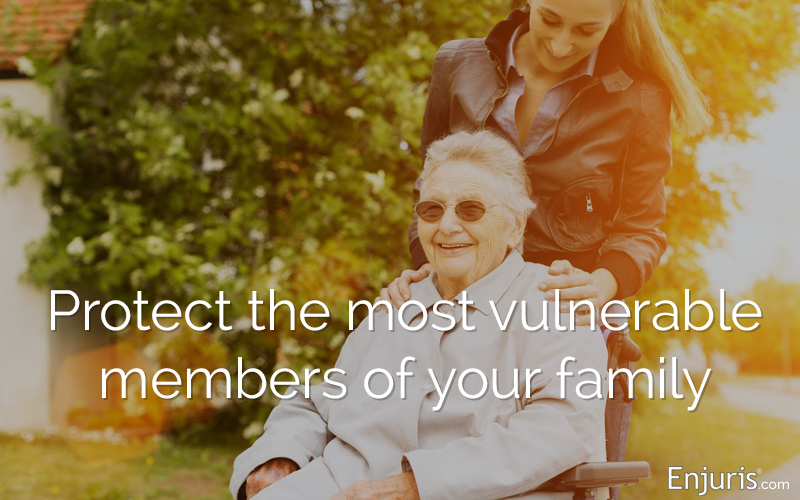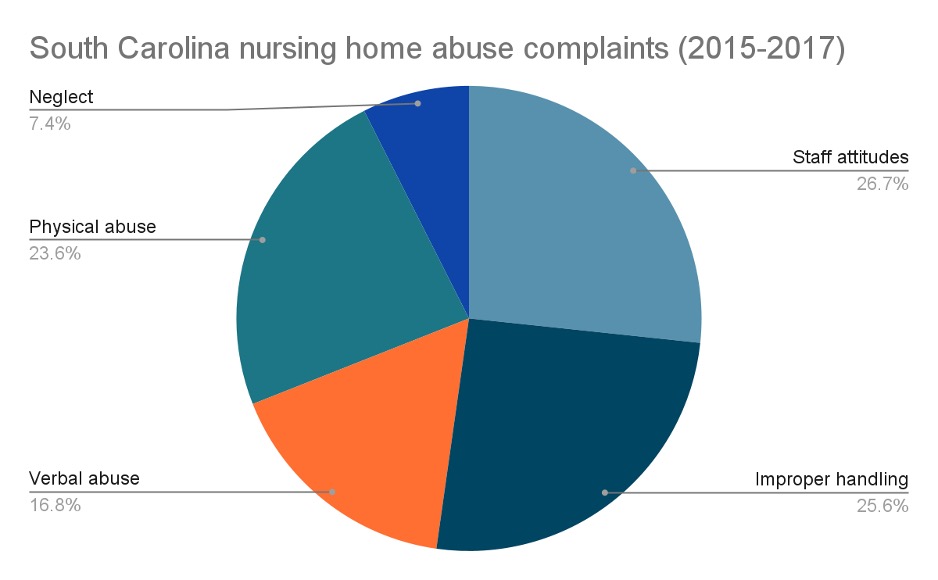Learn what to do if you suspect your loved one is being abused
Roughly 18 percent of the population in South Carolina are seniors. Although some of these seniors will live in their homes for the remainder of their lives (often called “aging in place”), others will transition into nursing homes or long-term care facilities.
There are an estimated 2,039 nursing homes with 43,678 beds in South Carolina.
Having a loved one in a nursing home can be a relief. Some people find that their loved one improves in a nursing home because they’re getting the consistent care that family members wanted to provide but couldn’t.
Unfortunately, not all seniors are taken care of in nursing homes.
What is nursing home abuse?
The term “nursing home abuse” is used to describe an act or omission (failure to act) that causes harm to a person in a long-term care facility.
The Centers for Disease Control and Prevention (CDC) recognizes 5 common types of nursing home abuse:
- Physical abuse. This type of abuse occurs when a resident experiences illness, pain, or injury as a result of the intentional use of physical force. Examples include hitting, kicking, pushing, slapping, and burning.
- Sexual abuse. This type of abuse involves forced or unwanted sexual interaction of any kind with a resident. This may include unwanted sexual contact, penetration, or noncontact acts such as sexual harassment.
- Emotional or psychological abuse. This type of abuse refers to verbal or nonverbal behaviors that inflict anguish, mental pain, fear, or distress on a resident. Examples include name-calling, humiliating, destroying property, or not letting the resident see friends and family.
- Neglect. The failure to meet a resident’s basic needs constitutes neglect. These basic needs include food, water, shelter, clothing, hygiene, and essential medical care.
- Financial abuse. This type of abuse involves illegally or improperly using a resident’s money, benefits, belongings, property, or assets for the benefit of someone other than the resident. Examples include taking money from a resident’s account without proper authority, unauthorized credit card use, and changing a will without permission.
How common is nursing home abuse?
According to the World Health Organization (WHO), 2 in 3 nursing home staff around the world report that they’ve committed nursing home abuse within the last year.
Is South Carolina any better?
Let’s take a look at the most recent data available:
| South Carolina reports of nursing home abuse (2017) | |||
|---|---|---|---|
| Abuse | Neglect | Exploitation | Total |
| 1,163 | 358 | 124 | 1,666 |
| Source: South Carolina Department of Aging | |||
According to the South Carolina Department of Aging (SCDOA), the most common nursing home complaints over a 3-year period were as follows:
What are the signs of nursing home abuse or neglect?
The sad reality is that many nursing home residents are unable to stand up for themselves or even tell loved ones that they’re being mistreated. Mental impairments, shame, and fear of retaliation all contribute to abused nursing home residents remaining silent.
Here are some signs of nursing home abuse to look out for:
- Your loved one stops taking part in activities they enjoy
- Your loved one has trouble sleeping
- Your loved one loses weight for no reason
- Your loved one becomes withdrawn or acts agitated or violent
- Your loved one displays signs of trauma (for example, rocking back and forth or appearing fearful)
- Your loved one has unexplained bruises, burns, cuts, or scars
- Your loved one develops bed sores or other preventable conditions
- Your loved one lacks medical aids (glasses, walker, dentures, hearing aid, medications)
- Your resident smells of feces or urine
- Your loved one begins making unusual purchases
How can you prevent abuse from happening in the first place?
Unfortunately, there is no way to completely guarantee that your loved one will not be abused in a nursing home. There are, however, certain steps you can take to reduce the chances that your loved one will be abused.
First and foremost, it’s important to investigate the nursing homes you’re considering entrusting your loved one to. Fortunately, there are a few online tools that can help:
- The Abuse Registry of South Carolina is a state-maintained database that allows you to look up specific nurses and determine whether they have received substantiated allegations of abuse.
- The Centers for Medicare & Medicaid Services (CMS) is a federal agency that regulates and provides ratings for nursing homes and skilled nursing facilities. You can look up a facility on their website.
- ProPublica is a nonprofit investigative news outlet that provides detailed data about nursing homes. You can search for a facility on their website.
Second, it’s a good idea to visit the nursing home in person. While you’re there, be sure to observe residents. Do they appear clean? Do they appear happy or depressed? Also, see how staff members interact with residents.
"Families should observe the environment and ask themselves, ‘Is the center calm and quiet or chaotic and noisy?’” says Dr. David Gifford, senior vice president of quality and regulatory affairs at the American Health Care Association.
Third, be sure to check in regularly with your loved one. AARP recommends looking at facilities located near relatives and friends. If a nursing home patient has frequent visitors, the facility employees will know that those visitors are scrutinizing the care they're providing.
What legal rights do nursing home residents have in South Carolina?
Every state, including South Carolina, has a set of laws (called the “Bill of Rights for Residents of Long-Term Care Facilities”) intended to protect older adults and adults with disabilities who are in long-term care facilities. In South Carolina, these laws can be found in Title 44, Chapter 81 of the South Carolina Code of Laws.
Below is a summary of residents’ rights under this law:
Bill of Rights for Residents of Long-Term Care Facilities
South Carolina Code of Laws 44-81-20 et. seq.
As a resident of a long-term facility in South Carolina, YOU have the right to:
MEDICAL TREATMENT
- Choose your own personal physician
- Receive from your physician a complete and current description of your medical condition in terms you understand
- Participate in planning the care and treatment you receive
- Refuse to participate in any type of experimental tests or research
- Have privacy during treatment
- Have your medical records treated with confidentiality
- Approve or refuse the release of your medical records to anyone outside your nursing home, unless you’re transferred to another health care facility or it’s otherwise required by law
- Be offered treatment without discrimination as to sex, race, color, religion, national origin, or source of payment
PERSONAL TREATMENT
- Be treated with respect and dignity
- Be free from mental or physical abuse
- Be free from restraints unless your doctor has ordered them
- Be free from working or performing services for your nursing home unless they’re are for therapeutic purposes
- Be discharged or transferred to another facility against your wishes only for: your welfare, the welfare of the other residents, medical reasons, or for nonpayment
- Be notified in writing at least 30 days prior to discharge or transfer
PERSONAL POSSESSIONS
- Have security in storing your personal possessions
- Approve or refuse the release of your personal records to anyone outside the facility, except as provided by law
- Keep and use personal clothing and possessions as long as they do not affect other residents’ rights
- Manage your personal finances
COMMUNICATION
- Have your legal guardian, family members, and other relatives see you when they visit
- Refuse to see your legal guardian, family members, and other relatives
- Send and receive mail with freedom and privacy
- Associate and communicate privately with persons of your choice
- Meet with your legal guardian, family members, or other resident’s family members to discuss your nursing home, so long as the meeting doesn’t disrupt resident care or safety
- Meet with and participate in social, religious, and community group activities, unless a written medical order prohibits such activity
PERSONAL PRIVACY
- Have privacy when receiving personal care
- Have privacy when visiting with your spouse
- Share a room with your spouse, unless your doctor forbids this in your medical record
- Have your personal records treated confidentially
- Employ a sitter from outside this facility to come and provide you with sitter services, unless you have already agreed in writing with this facility not to hire a private sitter
Additionally, there are a number of federal laws, including the Nursing Home Reform Act (NHRA), that provides residents with certain rights. For the most part, these rights mirror the rights found in South Carolina’s Bill of Rights for Residents of Long-Term Care Facilities.
If any of these state or federal rights are violated, nursing home residents (or family members acting on their behalf) can file a civil lawsuit to recover money damages.
Who’s liable when nursing home abuse occurs?
Nursing homes have an obligation to exercise due care to avoid harming residents. If the nursing home breaches this duty of care, the company that runs the nursing home may be held liable.
Examples of situations where a nursing home can be held liable include:
- Negligent training of staff
- Negligent hiring of staff
- Failure to provide adequate security
- Charging for unnecessary treatment
- Failure to implement procedures to protect against viruses and other diseases
- The imposition of unreasonable or dangerous physical restraints
The company that runs the nursing home can be held liable for the negligent actions of their employees under the doctrine of respondeat superior so long as the employee was acting within the scope of their employment at the time of the negligent action.
For example, a nursing home would not be held liable if an employee intentionally hit a resident because hitting a resident isn’t within the scope of employment. In such a situation, the employee could be sued individually.
What should you do if you suspect a loved one is being abused?
If you suspect abuse, call the SCDOA Long Term Care Ombudsman at 1-800-868-9095. Or, if you suspect your loved one is in imminent danger, call 9-1-1 or remove them from the facility.
Finally, if you believe abuse or neglect has occurred, a personal injury lawyer can help you investigate the abuse and seek financial compensation.
Contact a South Carolina personal injury attorney using our free online directory.
See our guide Choosing a personal injury attorney.



